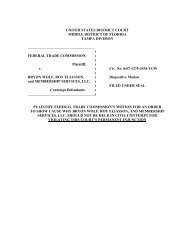Gasoline Price Changes - Federal Trade Commission
Gasoline Price Changes - Federal Trade Commission
Gasoline Price Changes - Federal Trade Commission
You also want an ePaper? Increase the reach of your titles
YUMPU automatically turns print PDFs into web optimized ePapers that Google loves.
THE DYNAMIC OF SUPPLY, DEMAND, AND COMPETITION<br />
A. Vertical Integration May Be Cost-Effective for a Firm.<br />
As a general matter, firms may integrate vertically – that is, own assets to perform more<br />
than one step in the production, distribution, and marketing of a good – because integration can<br />
lower costs. In certain circumstances, vertical integration can (1) reduce transaction costs; (2)<br />
prevent contractual partners from taking advantage of a firm; (3) eliminate double markups and<br />
thereby increase overall demand for a product; and (4) eliminate distortions of input choices<br />
when a supplier has market power. 54<br />
1. Reduce transactions costs.<br />
When two separate firms enter into a supply relationship, they must negotiate the terms<br />
of that supply relationship. For example, the two firms must agree on and enforce prices,<br />
quantities, and other terms of trade. Such contract negotiations cost money in terms of personnel<br />
time, legal advice, and other matters. Vertical integration can reduce such transactions costs, if it<br />
is easier to establish these terms through direct managerial control of two business units than<br />
through either (1) long-term contracts, or (2) repeated, arm’s-length transactions with firms<br />
selling in spot markets. 55 If the mutually beneficial terms of the trade between two vertically<br />
related business units are complex, and it is difficult to specify all future contingencies within a<br />
contract, using direct managerial control is likely to reduce transactions costs below those<br />
associated with contractual relationships.<br />
2. Prevent opportunism by contractual partners.<br />
To prevent contractual opportunism means to eliminate the risk that one party to a<br />
contract will take advantage of the other. This can happen if a contract is “incomplete” – that is,<br />
the contract fails to specify the rights and obligations of the parties in all possible circumstances.<br />
When a contract is incomplete, unforeseen circumstances may allow one of the firms to benefit<br />
unduly from the terms of the contract. This type of risk tends to be more significant when<br />
potential contract partners need to invest in specialized assets to create the value resulting from<br />
the proposed contract. For example, a very heavy grade of crude oil might require special, longlived<br />
investments in refinery-processing equipment to produce high-value refined products.<br />
These special investments, however, may have relatively little value in processing other types of<br />
crude oil. Therefore, to make such investments worthwhile, a refiner would need a reliable<br />
source of heavy crude oil. To rely on a long-term supply contract with a producer of heavy<br />
crude oil, a refiner typically would require the contract to be sufficiently complete. To negotiate<br />
a sufficiently complete contract may be very costly, however. If a sufficiently complete contract<br />
could not be negotiated, vertical integration between the very heavy crude oil producer and the<br />
refiner might be required to achieve the transaction.<br />
CHAPTER 5: STATE & LOCAL POLICIES, & VERTICAL INTEGRATION 119
















